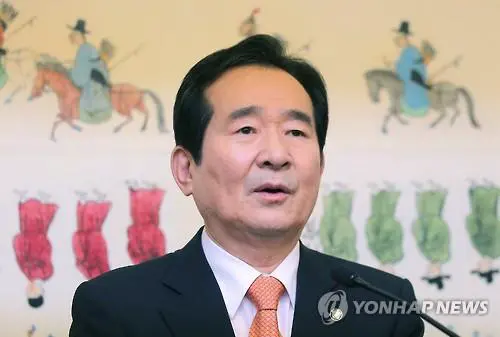Newly-elected South Korean parliamentary chief on Thursday reiterated his call for constitutional revision to introduce a new government power system in accordance with changed social and political circumstances.
National Assembly Speaker Chung Sye-kyun told his inaugural press conference that the issue on constitutional revision is no longer a subject to discuss, but a "matter of will," expressing his hopes to wrap up the issue before the newly-launched parliament finishes its term in 2020.
Chung repeated his position after he broached the issue on Monday when the 20th National Assembly officially opened its four- year term following the April 13 general elections.
There have long been demand to amend the constitution, which was last revised in 1987 to adopt a single-term presidential system and a single-member parliamentary system in every electoral district.
The so-called "Year 1987 regime" has been considered decrepit since the constitution failed to reflect political, social and economic changes having taken place in the country in past three decades.
The five-year, single-term presidency is being under criticism that every president cannot set a long-term policy strategy on worries about a new president's suspension, or even abolition, of policies pursued by predecessors.
According to a local pollster Realmeter survey of 515 adults, 69.8 percent of respondents favored the constitutional amendment, much higher than 12.5 percent against the revision.
Four-year, two-term presidency was most favored by 41.0 percent of respondents, with 19.8 percent picking the semi-presidential system in which a president and a prime minister share government powers. The parliamentary cabinet system, in which the government is formed by lawmakers, was favored by 12.8 percent.
The single-member parliamentary system is also being criticized for its winner-takes-all effect that can neglect demand from people who voted for failed candidates.
Many of South Korean politicians shared the need for constitutional revision in principle, but showed different views over ways and timing according to political interests.
Chung Jin-suk, floor leader of the ruling Saenuri Party, told a party meeting that he personally shares views over the 1987 regime facing limits, but he noted that it needs to review once more about a national consensus being formed toward the launch of discussions on it right now.
The main opposition Minjoo Party's floor leader was quoted by Yonhap news agency as saying that he favors discussions on it, but he showed different positions on how to discuss the issue compared with those advocated by the ruling party.
The minor People's Party floor leader expressed his opinion in favor of forming a special parliamentary committee to discuss the constitutional amendment, but he said details on how to form the committee have yet to be discussed.
The presidential office Cheong Wa Dae had opposed to discussions on the amendment, calling it a "black hole" that can absorb all attentions from government efforts to revitalize the economy.
Asked about calls for constitutional revision, presidential spokesman Jung Youn-kuk told reporters that there has been no change or difference in the presidential office's position.
(APD)
 简体中文
简体中文





